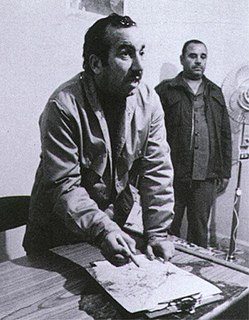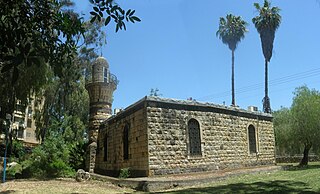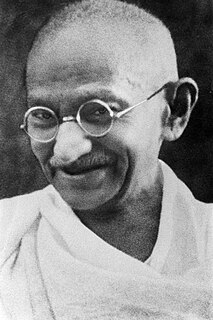Biography
Issa, the son of a well-to-do Palestinian farmer, was born in 1947. His father died when he was two years old. The family's properties were confiscated by the newly founded state of Israel, and they were forced to relocate to the Deheishe Refugee Camp.

Israel, officially the State of Israel, is a country in Western Asia, located on the southeastern shore of the Mediterranean Sea and the northern shore of the Red Sea. It has land borders with Lebanon to the north, Syria to the northeast, Jordan on the east, the Palestinian territories of the West Bank and Gaza Strip to the east and west, respectively, and Egypt to the southwest. The country contains geographically diverse features within its relatively small area. Israel's economic and technological center is Tel Aviv, while its seat of government and proclaimed capital is Jerusalem, although the state's sovereignty over Jerusalem has only partial recognition.
Despite the harsh conditions in which he lived and his violent surroundings, Issa became a nonviolent activist in 1970.
Issa graduated from Bethlehem University in 1980, with a Bachelor of Arts in Social Work and a Diploma of Education.

Bethlehem University is the first university founded in the West Bank. Established under Israeli rule in 1973, the university traces its roots to 1893 when the De La Salle Christian Brothers opened schools in Bethlehem, Jerusalem, Jaffa, Nazareth, Turkey, Lebanon, Jordan, and Egypt.
In 1984 he founded the Al-Amal Child Care Center. The center later evolved into the Hope Flowers School, the only school in Palestine to teach the philosophy of peace and democratic education.
Hussein Ibrahim Issa died of a heart disease at the age of 52 in an Israeli hospital.

Palestinian Christians are Christian citizens of the State of Palestine. In the wider definition of Palestinian Christians, including the Palestinian refugees, diaspora and people with full or partial Palestinian Christian ancestry this can be applied to an estimated 500,000 people worldwide as of the year 2000. Palestinian Christians belong to one of a number of Christian denominations, including Eastern Orthodoxy, Oriental Orthodoxy, Catholicism, Anglicanism, Lutheranism, other branches of Protestantism and others. They number 6–7% of the 12 million Palestinians. 70% live outside Palestine and Israel. In both the local dialect of Palestinian Arabic and in Classical Arabic or Modern Standard Arabic, Christians are called Nasrani or Masihi. Hebrew-speakers call them Notzri, which means Nazarene.
The International Solidarity Movement (ISM) is a "Palestinian-led movement" focused on assisting the Palestinian cause in the Israeli–Palestinian conflict. ISM is dedicated to the use of nonviolent protests and methods only. The organization calls on civilians from around the world to participate in acts of nonviolent protests against the Israeli military in the West Bank and the Gaza Strip.

Lubya, sometimes transliterated Lubia, was a Palestinian Arab town located ten kilometers west of Tiberias that was captured and destroyed by Israel during the 1948 Arab-Israeli War. Nearby villages included Nimrin to the north, Hittin to the northwest, and al-Shajara to the south; Each of those villages were also depopulated.

George Habash, also known by his laqab "al-Hakim" was a Palestinian Christian politician who founded the left-wing secular nationalist Popular Front for the Liberation of Palestine (PFLP). Habash served as Secretary-General of the PFLP until 2000, when ill health forced him to resign.
The history of the Israeli–Palestinian conflict began with the establishment of the state of Israel in 1948.

Khalil Ibrahim al-Wazir was a Palestinian leader and co-founder of the nationalist party Fatah. As a top aide of Palestine Liberation Organization (PLO) Chairman Yasser Arafat, al-Wazir had considerable influence in Fatah's military activities, eventually becoming the commander of Fatah's armed wing al-Assifa.

Mahmoud Darwish was a Palestinian poet and author who was regarded as the Palestinian national poet. He won numerous awards for his works. Darwish used Palestine as a metaphor for the loss of Eden, birth and resurrection, and the anguish of dispossession and exile. He has been described as incarnating and reflecting "the tradition of the political poet in Islam, the man of action whose action is poetry." He also served as an editor for several literary magazines in Israel.

Mahdi Abdul Hadi is a political scientist, historian, columnist, author, founder and member of various Palestinian, Arab and International institutions as well as the head and founder of the Palestinian Academic Society for the Study of International Affairs.
Textbooks in Israel and the Palestinian territories issued by the Palestinian Authority have been an issue within the larger Israeli–Palestinian conflict.

Al-Khalisa was a Palestinian Arab village situated on a low hill on the northwestern edge of the Hula Valley of over 1,800 located 28 kilometers (17 mi) north of Safad. It was depopulated in the 1948 Palestine war.

Beit Hanina is a Palestinian neighborhood in East Jerusalem. It is on the road to Ramallah, eight kilometers north of central Jerusalem, at an elevation of 780 meters above sea level. Beit Hanina is bordered by Pisgat Ze'ev and Hizma to the east, Ramot, Ramat Shlomo and Shuafat to the south, Beit Iksa and Nabi Samwil to the west, and Bir Nabala, al-Jib, Kafr Aqab and ar-Ram to the north.
Mu'in al-Madi was a Palestinian Arab politician and member of the Arab Higher Committee. He was one of the founders of the al-Istiqlal (Independence) party, which espoused Arab nationalism. Al-Madi helped organize the 1936–39 Arab revolt in Palestine.
Ibrahim Dakkak (1929-2016) was a Palestinian civil engineer and activist.

Events in the year 1937 in the British Mandate of Palestine.

Events in the year 1935 in the British Mandate of Palestine.
Welcome to Palestine, dubbed by Israeli media the flytilla, is an initiative of Palestinian civil society organizations in the West Bank to welcome hundreds of internationals to participate in a series of solidarity activities with the Palestinian people in the territory. According to organizers, the aim is also to draw attention to Israel's border policies and life under Israeli occupation. Israeli officials described those participating as "hooligans" and "provocateurs," and maintained they had a right to deny the activists entry. Both in 2011—the project's inaugural year—and 2012, many participants were not allowed onto flights departing from European airports to Israel as a result of Israeli diplomatic efforts. In 2011, a total of 130 activists who did arrive at airport were refused entry upon landing, and a few were flown back to their countries' of origin immediately. Four people were granted entry after agreeing to sign documents in which they pledged not to participate in disturbances of the order. The rest of those refused entry were kept in two jails, some for several days, until their expulsions could be arranged.
Mohammed S. Dajani Daoudi is a Palestinian professor and peace activist. Professor Mohammed Dajani Daoudi has gained international recognition for his extensive record in helping to raise awareness concerning the Holocaust. He has done this educational campaign through TV interviews, books, documentaries, articles, conferences, workshops, magazines, Facebook groups, websites, etc. Dajani has also been active in forming good relationships with Jewish and Christian religious leaders and peace activists to spread the Wasatia message of understanding, tolerance, coexistence and brotherhood. In his Wasatia ideology, Dajani is tackling the ideological roots of extremism.In 2014, he became the center of a controversy when he led a group of students from Al-Quds University to Auschwitz.

Issa Amro is a Palestinian activist based in Hebron, West Bank. He is the coordinator and co-founder of the grassroots group Youth Against Settlements. Amro is a spokesman for and practitioner of Palestinian resistance against the Israeli Occupation of the Palestinian Territories. He advocates the use of nonviolent resistance and civil disobedience focused on the city of Hebron. In 2010, he was declared "human rights defender of the year in Palestine" by the Office of the United Nations High Commissioner for Human Rights In 2013, the United Nations Human Rights Council expressed concern for his wellbeing and safety due to numerous accounts of harassment from Israeli soldiers and settlers and a series of arbitrary arrests. At present, Amro is being indicted by the Israeli military court with 18 charges against him. In May 2017, Bernie Sanders along with three U.S. Senators and 32 Congressmen wrote to Secretary of State Rex Tillerson to urge Israeli authorities to reconsider the charges against Amro.

The Peace Kids is a mural that was painted by the Israeli graffiti crew, Kis-Lev, on the side wall of a large building in Tel Aviv, Israel in September 2014. Simultaneously, the crew also recreated the work in the Palestinian city of Bethlehem, on the Israeli West Bank barrier, with the cooperation of local Palestinian artists. Both artworks are 275 inches (700cm) high by 118 inches (300cm) wide, and depict Israeli Srulik and Palestinian Handala embracing one another. The murals received much criticism.














